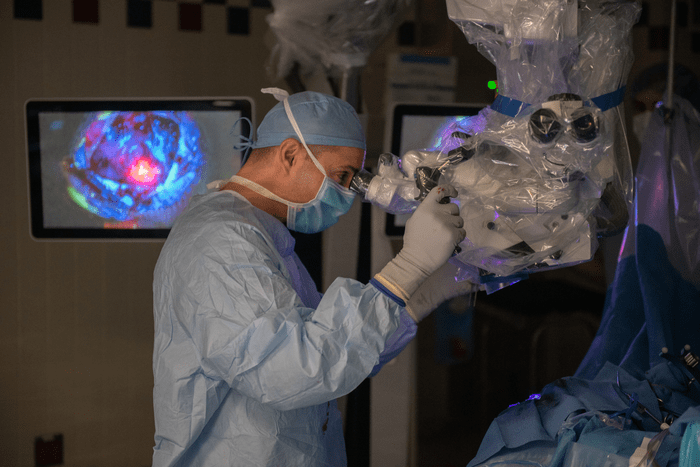DETROIT (Jan. 12, 2023) – Henry Ford West Bloomfield Hospital has begun using Gleolan®, a one-of-a-kind optical imaging agent that illuminates a common and devastating type of brain tumor called glioma. Gleolan is Food and Drug Administration (FDA) approved for use in patients with high grade gliomas, which means the tumor is suspected World Health Organization Grades III or IV on preoperative imaging. The first brain tumor resection at Henry Ford West Bloomfield Hospital with Gleloan was performed by Adam Robin, M.D., neurosurgeon at Henry Ford’s Hermelin Brain Tumor Center (HBTC).
“We are committed to providing our patients with the leading edge, evidence-based therapeutic options available today,” said Manu Malhotra, M.D., Chief Medical Officer at Henry Ford West Bloomfield Hospital. “With the addition of this unique imaging technology, our clinicians are empowered to expand our treatment options and push the boundaries of the most advanced and potentially lifesaving treatments for brain cancer.”
Gleolan is the only product approved by the FDA that highlights a glioma tumor and surrounding cancer tissue in a bright hue, making it easier for neurosurgeons to see the tumor tissue to be removed. The enhanced visualization enables a neurosurgeon to identify and remove as much of the cancer as possible, which increases the chance for better patient outcomes.
“When surgically resecting a brain tumor, our aim is always to remove it completely,” said Dr. Robin. “When using this imaging agent, we perform the tumor resection procedure under a special blue light, which causes the tumor cells to be bright pink or magenta in color. This visual aid enhances our ability to identify tumor cells that otherwise may have been hidden or more challenging to identify.”
Even with the most modern technology, it’s often difficult for surgeons to determine whether they have removed all of a brain tumor. Glioma treatment can present a particular challenge because the tumors often have “finger-like” projections that extend into different parts of the brain.
Glioma is a primary brain tumor, which begins in the glial cells that surround and support nerve cells. It is the most common type of adult brain tumor (comprising 78% of malignant brain tumors in adults) and the most common pediatric solid tumor, accounting for approximately 53% of tumors in children younger than 14 years. An estimated 700,000 people in the United States are living with a primary brain tumor.
Henry Ford’s HBTC is a national leader in the diagnosis and treatment of brain tumors, and has been recognized since 1993 by the National Cancer Institute for delivering leading brain tumor therapies. The center offers individualized treatment plans and world-class, coordinated care teams utilizing the latest tests available for accurate brain tumor diagnosis and treatment guidance. Gleolan is also used at Henry Ford Hospital in Detroit.
In the initial randomized, controlled clinical trial performed in the U.S., some patients were given Gleolan before glioma surgery. They had twice the rate of survival without progression after six months compared to patients who did not receive Gleolan.
To learn more about Gleolan at Henry Ford Health, visit henryford.com/services/brain-tumors/treatments/surgery/gleolan.
###
MEDIA CONTACT: Jeff Adkins / 586.307.2027 / jadkins6@hfhs.org
About Henry Ford Health
Serving communities across Michigan and beyond, Henry Ford Health is committed to partnering with patients and members along their entire health journey. Henry Ford Health provides a full continuum of services – from primary and preventative care, to complex and specialty care, health insurance, a full suite of home health offerings, virtual care, pharmacy, eye care and other healthcare retail.
It is one of the nation’s leading academic medical centers, recognized for clinical excellence in cancer care, cardiology and cardiovascular surgery, neurology and neurosurgery, orthopedics and sports medicine, and multi-organ transplants. Consistently ranked among the top five NIH-funded institutions in Michigan, Henry Ford Health engages in more than 2,000 research projects annually. Equally committed to educating the next generation of health professionals, Henry Ford Health trains more than 4,000 medical students, residents and fellows every year across 50+ accredited programs.
With more than 33,000 valued team members, Henry Ford Health is also among Michigan’s largest and most diverse employers, including nearly 6,000 physicians and researchers from the Henry Ford Medical Group, Henry Ford Physician Network and Jackson Health Network.
The health system is led by President and CEO Robert G. Riney and serves a growing number of customers across 250+ locations throughout Michigan including five acute care hospitals, two destination facilities for complex cancer and orthopedics and sports medicine care, three behavioral health facilities, primary care and urgent care centers.
















